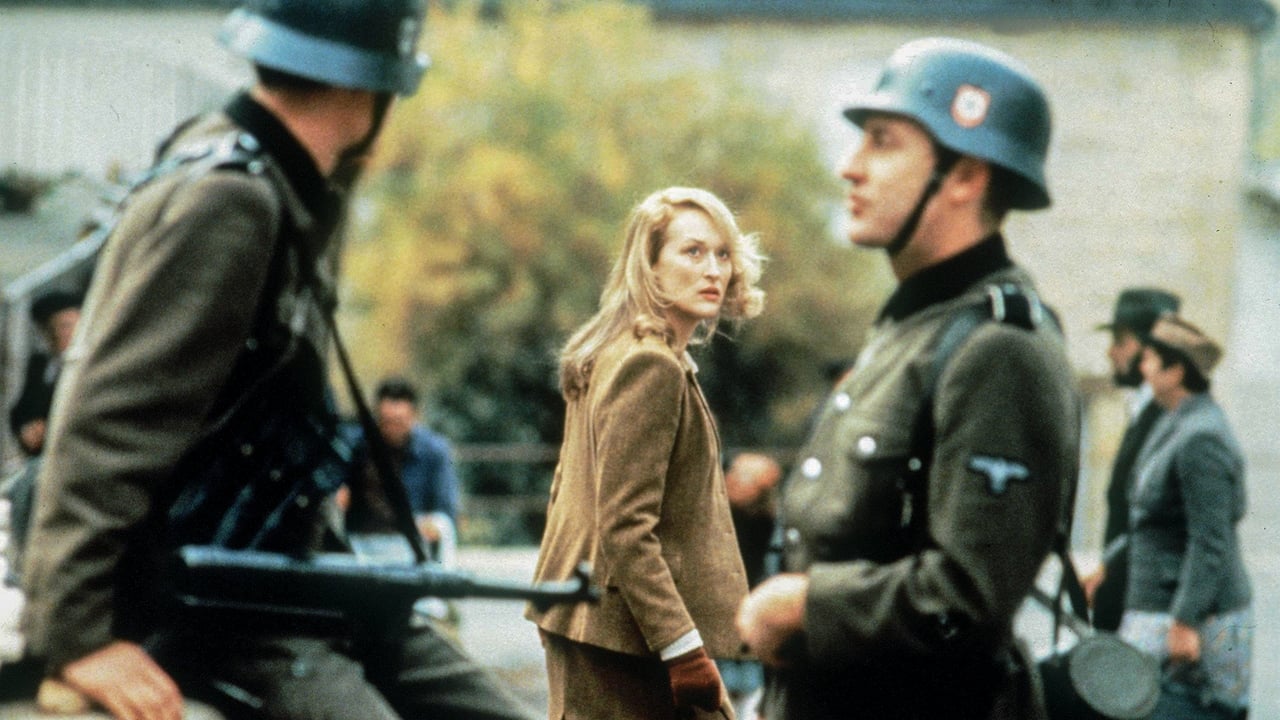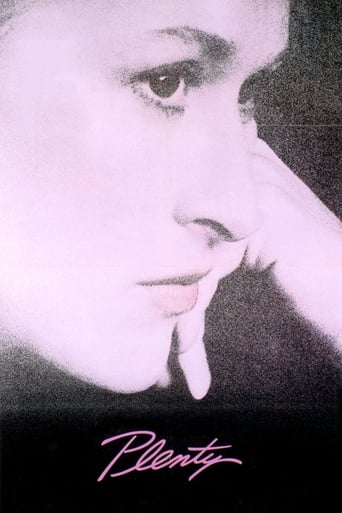

Meryl Streep plays Susan Traherne, a former resistance fighter in World War II who struggles to find meaning in her life decades after the war is over. She is unhappily married to a man(Charles Dance) who isn't ambitious enough for her, and he finds himself increasingly enraged by her self-destructive ways and interference in his professional life. Susan has a friend(played by Tracy Ullman) that she is close to, but who also has her own problems. Susan has an affair with another man(played by Sting), but finds herself thinking about her former lover from the war(played by Sam Neil) whom she does meet again, but it doesn't go the way she had hoped...Well-acted but incredibly dreary film has some beautifully directed (by Fred Shepisi) sequences, and Meryl is as attractive as ever, but her character wears out her welcome after a while, and relentlessly cynical film becomes tiresome.
... View MoreI have known this movie now for 30 years. Almost no one I know saw it back in 1985. The one person who did see it didn't understand it, though he tried. His feelings were neutral, but his bewildered description intrigued me. He didn't get what I've got out of it all these years. I find it meaningful in different ways in each phase of my life, Now I see a strong message of the futility of trying to recapture the past, the intensity of the past, or one's youth. There is also a tacit reading of the film that the world grows less interesting over one's life, until one is left in a bland holding pattern. Each frame of the movie stands as a testimony to how much better things used to be, when you were young and feeling things intensely.The most generous thing you might feel about these character is confusion or ambivalence. You do not grow fond of them as the movie proceeds. Some of them are contemptible and/or dysfunctional. There is more to movies than liking the characters. This is a movie for thinking viewers, which were rare in 1985, and now all but gone.The movie is never jejune or coddling as later Streep movies are (Julia and Julia, The Devil wears Prada - weak filmmaking) and that's a testimony to capability of director Fred Schepisi, who seems to only film thoughtful scripts. Schepisi is a criminally underrated director. Schepisi also did good work on A Cry in the Dark, and really excellent work on The Devils Playground. As with all his movies this one is beautifully lensed, and the aspect ratio is very elegant.If anything is wrong with the movie it's that there's too much of the Charles Dance character (the bland, decent, diplomat husband) in it, especially in the last 45 minutes. He's not interesting, doesn't make a very good foil, and in some scenes seems to only exist as a device glue said scenes together.This is hard to track down, but is far better movie than Sophie's Choice, Silkwood, Out of Africa, where Streep played characters with more easily described dilemmas.
... View MoreThis is one film which has grown on me since I saw it on main circuit. It is an intelligent film, which demands a lot of active viewing. Aided with an incisive script by David Hare, it looks at Britain's history from the end of WWII, through to Queen Elizabeth's coronation the Suez Crisis, all counterpointed by the lead character, Susan Treherne (played, in I think one of her best moments, by Meryl Streep.) The film plays on the word "Plenty" and the hope for UK after WWII that there would be plenty - in itself ironic. It is also a study of a woman afflicted by bipolar disorder (manic-depression). This is not the focus of the film; in fact, it is never explicitly stated.... At the time portrayed, psychiatric illness wasn't acknowledged - it tended to be swept under the carpet.Streep imbues Susan with a dignity, despite her liking to "lose control"; there are excellent performances by Sam Neill (Lazar, her war-time "love"), Tracey Ullman, Sting, Charles Dance (her long-suffering husband) and John Gielgud (as the diplomat who takes the fall for the Suez Crisis.) It's not an easy film, but worth watching and discussing. It must be one of the most underrated films on IMDb.Do yourself a favour, ACTIVELY engage with this. Don't let this film be overshadowed by Meryl Streep's other films of this time, like the overrated Out of Africa. They don't hold a torch to this film!
... View MoreThere is now and has been since 1985 a lot of conjecture as to what this film is about. The reaction I had after I first saw this film was one of the first times I was genuinely depressed after I had seen a film. Depressed by an outside force not from within myself. Women in my family were of the similar age Meryl Streep's character of Susan Traherne...so I asked them how they felt during the war and after. Their candid replies (not prompted by any film discussion either) led me to believe PLENTY was a state of mind, a post war feeling of "winner's feast after survival"...I came quickly to realize Susan Traherne, her men, her lovers, her descent into disillusionment, unhappiness, into madness, irrationality. the realization she had to live with herself and her gauche cruelty, snobbery, foolishness and self deceit... was about Great Britain herself, Susan is the Nation, Brittania. PLENTY is possibly the saddest film I have ever seen, on par with MILLION DOLLAR BABY but for different reasons. I also think Susan represents the women baby boomers in every country had as their Mother, who after taking a deep sunny breath of freedom after struggle found that their family and suburbia was a prison and that post war servitude and struggle was the hell they never reckoned with. PLENTY is a great title for this film of 'the promised land" that turned into a supermarket car park. I never want to see it again. Such is the heartbreaking success of this production. PLENTY is a major achievement in film making and it's emotional reality is absolutely crushing.... like Susan's soul and promise was crushed by post war plainness. THE HOURS goes into the same territory in the 1950s sequences with Julieanne Moore wanting to suicide. Susan's sex scene during the Queen's coronation is the cruelest, most superb observation of the relationship between the Royal family and Britain. PLENTY is a character study and not a popcorn movie. Not all films are 'flicks' as some people demand they be. THE FIGHT CLUB and the effect on 30 year old men of today of the pressures commercial modern living as personified by Ed Norton in his famous "ikea" speech is a good equivalent for today's crushed male soul.
... View More